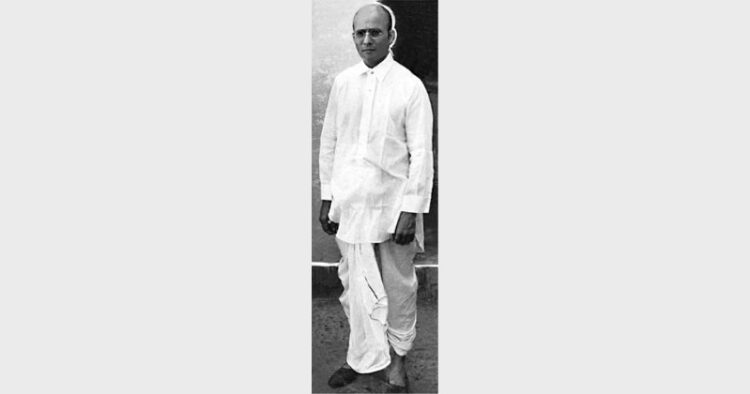
Veer Savarkar
It is much easier to enjoy the ascent to top positions simply by virtue of being born in a family of influence. But it is not easy to be a Savarkar. Rather it is impossible to be a Savarkar
Sanjay Goyal
It is not easy to be a Savarkar. While struggle for freedom ended on the day India got Independence in 1947, the struggle of Savarkar still continues and there seems to be no end. Not even after his death. This ‘veer sapoot’ of Bharatmata faces character assassination every single day in the country for which he went through so much of pains. He could have been a very successful lawyer but chose to be a revolutionary, a reformist and the flag bearer of Hindutva.
The British never considered Veer Savarkar as political prisoner, facing the charges of murder of Nashik Collector Jackson and waging a conspiracy against the King Emperor (British), Veer Savarkar was awarded 50 years life imprisonment and that too in notirious jails of Andaman & Nicobar Islands. This was in complete contrast to symbolic confinement of big named political leaders to the make shift jails. These big named political leaders later enjoyed fruits of Independence, but Veer Savarkar was tried for assassination of Mahatma Gandhi, though acquitted later.
In a country predominantly ruled by the people having a different ideology, rather an ideology against which Veer Savarkar fought during his struggle for freedom, Veer Savarkar never got his due credit for contribution to the country’s freedom struggle. Rather, he is maliciously referred to as someone who sought apology from the British, while the fact is that he only followed a due process of law and filed clemency petition for getting out of prison, exercising legal options available to him for release from Jail.
The great Veer Savarkar never got credit for reforms that he tried to bring in society for removing untouchability, he started first Ganeshotsva in Ratnagiri where so-called untouchables could participate, the setting up of Patitpavan Mandir where the untouchables could also visit. We know who got all the credit and why, but Savarkar is never awarded with this kind of credentials since he was fighting against the ideology of an outfit which ruled this country.
He should be known as someone who ignited the fire for freedom in the oppressed Hindu society. A society which was suppressed for so many years by Mughal rulers and later by the British. Veer Savarkar should be known for his inclusive definition of Hindutva and how he described several religions as one including Buddhism, Sikhism, Jainism etc. He was someone strongly opposed to the idea of Partition of this nation on communal lines but how could he get due credit when the country was ruled predominantly by the outfit which accepted Partition and enjoyed fruits of power uninterrupted for decades.
But people try to make Veer Savarkar look bad for wrong reasons. His struggle still continues when his character assassination is done till this day by ideologically different political people.
It is more easy to borrow a big surname different from your family name and make it your surname for political gains. It is much easier to enjoy the ascent to top positions simply by virtue of being born in a family of influence. But it is not easy to be a Savarkar rather it is impossible to be a Savarkar, the Veer Savarkar who gave up the comforts of being a great lawyer, the man who preferred to be averse to a political outfit close to power, the man who fought for pride of this great nation. Savarkar is the name earned for courage, patriotism and struggle. Salute to him. Wish I could be a Savarkar.
(The writer is a self-employed professional and columnist)













Comments